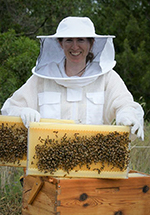

Queensland’s Bee Biosecurity Officer Rebecca Laws has taken her bee biosecurity workshops online.
From 26 May to 21 July 2020, Rebecca will present a talk every second Tuesday at 7 pm AEST. She will cover a range of bee biosecurity topics including how to check your hive for pests and diseases and hot topics such as varroa mites.
Each talk will be followed by a live Q&A session, you can ask your questions on the night or e-mail them to Rebecca in advance.
You can register for free in advance (if you would like a reminder) or simply click on the link on the night.
You will need to download the free Microsoft Teams app in advance if you are tuning in from a smartphone or tablet. The Microsoft Teams app is available for Apple and Android devices.
26 May — Good bee biosecurity
Rebecca’s first online talk will cover bee biosecurity basics including registering and marking your hive(s), protecting your hive(s) from pests and diseases, and reporting suspect bee pests.
9 June — Bee brood diseases
Several bee brood diseases are common in Queensland and can pose a huge risk to your honey bee hive. In this talk, Rebecca will cover the key brood diseases, how to check your hive for them and what to do manage and prevent them.
23 June — Mites and external parasites
Varroa mites are one of the biggest risks to Australian honey bees. Join Rebecca for this talk to learn how to perform essential monitoring techniques for these devastating pests.
7 July — How to submit samples for disease testing
If you’re unsure what pest or disease might be affecting your honey bee hive, you can send a sample to the Biosecurity Sciences Laboratory. In this talk, Rebecca will cover how to prepare and submit a sample, when fees are applicable, what happens with your sample in the lab, and what to do when you get your results back.
21 July — The Australian Honey Bee Industry Biosecurity Code of Practice
In this talk, Rebecca will discuss the components and benefits of the Code, and how to ensure you are compliant.